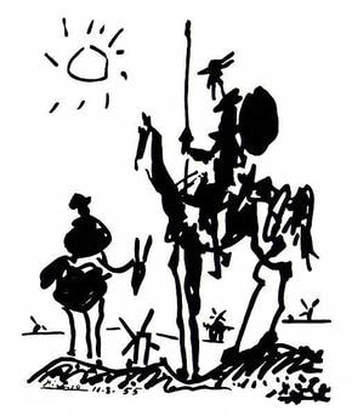|
Picasso Dreams of Don Quixote and Sancho Panza:
In the Shadow of Windmills on the Plains of La Mancha, Campo de Montiel, Spain, March 15, 1565 DREAM #1: Don Quixote, 57, Knight Errant de la Mancha I know better than believe these windmills to be giants, yet what right man would not choose a world of maidens, beautiful and fair, high romance, a king’s ransom, and a dragon’s lair when weighed against the daily life we live? So I set forth on a long-tooth nag and this old fool by my side to roam abroad the country wide, to court adventure and quell the searing fear of death inside us all, and poor poor Panza, he cannot see because he has no questful eyes, not for any dreams beyond his monstrous belly—yet I know these things exist, the same as I know God does not—still there I am weekly at mass, thumbing my rosary on bended knee, a devout, praying at each station of the cross, all because I desire the approval of Father, who, once Mother had passed, locked the doors and read himself away to death—and so too have I consumed a library full of fantasy, though I will not be my father, will not pine loveless and a loon in some dusty hidden room—I know that before me, squat and bright in lye-washed white, is no giant at all, but I will it so and so it is—and how can a man who knows he is mad be truly mad after all, especially one who knows his life draws near to close and wants only one more moment of adventure’s good grace—so, Hie, vale anon! I spur dear rack of bones Rocinante onward and into the giant’s flailing arms, aware that his time too is at hand and shall too like Father pass from this world: I smash my wooden lance against his jaw but, Grim Reaper-like, he grabs my steed and self and sends us over—the world whirls by like a Bedouin dervish and slams us on the ground—in in the distance I see clouds in the shape of buzzards, beautiful and languid and hungry, and just above me, the windmill’s slow eternal spinning hands. DREAM #2: Sancho Panza, 47, an illiterate squire Under this unforgiving sun, I sit mule-back in the meagre shade afforded by a lone olive tree and I pick the fruit and bite and find it bitter. My bile rises for the want of brine. And of capers and of caper berries and of all things pickled and delicious. My donkey Dapple’s head is like a giant shovel and his large jutting jaw an insatiable maw! Oh what I could eat if I but had that hasp: In one Rabelessian moment, a dozen bocadillo con jamon y queso de cabra. And though I am but a goat at jest, I am still less than half as daft as this man here who’s taken leave of his senses, every one, pressed he claims into blessed service by God’s own voice. But it’s plain to see there will be no boquerones en vinagere, no ajo blanco with a nubile Mudéjar to grind the garlic with mortar and pestle, and no bread with which to sop it up, no bladders of wine at the ready, no gypsy girl to tickle my feet with rosemary branches as we moon over my island paradise, where I serve as Lord and Governor and bring together the Moor and the Jew and the Catholic alike: Come friends, one and all, come and bare your breasts and souls and be my guests. My ass is swayed and my back is bulging with the fat of years and indolence and friendships raised and toasted and devoured. Don Quixote has promised me this sacred isle de pace, but now, seeing his broken body lying in the earth beneath the tall and twisting windmill, all hope for it is dashed. But shall I leave him, return to my home and to my old wife, she who waved me a fond farewell, or to my daughter, who is herself old enough to marry, both who berate me so and so were happy to see me go? True, the old man is little more than bluff and bluster, hot wind and noisy clang, like the time the wind rose and sang and loosed the Santa Maria bell from its moorings and blew it out of the church tower, bats bursting forth in all directions—the bell and frayed rope fell an impossibly long time and crashed in the earth, cracked, and let off one last note that tolled in the square for nearly a year, the noise caught somehow in the old winding streets, confused and lost with no way nor want to find its way home. Michael Garriga A native of the Gulf Coast of Mississippi, Michael Garriga is the author of the short story collection, The Book of Duels (Milkweed Editions, 2014). His work has appeared in The Southern Review, New Letters, Oxford American, and various other journals. He is also the co-editor of the literary journal, FictionSoutheast.com. He teaches creative writing at Baldwin Wallace University in Berea, OH, where he lives with his wife and two sons.
0 Comments
Your comment will be posted after it is approved.
Leave a Reply. |
The Ekphrastic Review
COOKIES/PRIVACY
This site uses cookies to deliver your best navigation experience this time and next. Continuing here means you consent to cookies. Thank you. Join us on Facebook:
July 2024
|




